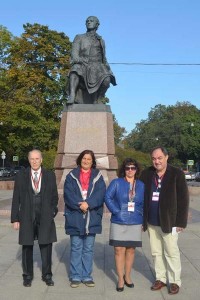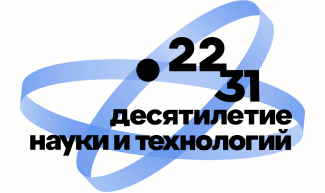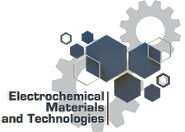Mr Panagiotis Tsiakaras, a professor of the Thessaly University (Greece) and a partner of the Institute of High-Temperature Electrochemistry of UB RAS together with his colleagues from Ural received the Russian government Mega-grant for developing solid oxide fuel cells – SOFC. Fot the first time he came to Yekaterinburg in April 2014. Since then the Greek scholar has been visiting the city many times as he was appointed as a supervisor of a newly created lab “Electrochemical Devices Based on Solid Oxide Proton Electrolytes” in the IHTE UB RAS. During his last visit to Yekaterinburg professor Tsiakaras told us about the project achievements and shared his impressions about the “Science of the Future” first international Mega-grants conference which was held in St. Petersburg, September 17th-20th. He attended the conference together with his IHTE colleagues. “It is just a great initiative proposed by the Ministry of Education and Science of Russian Federation” – thinks the Greek electrochemist. “160 participants – scientific supervisors of Mega-grants shared their cooperation experience and presented their research results. I met there some old friends from the Institute of Catalysis of SB RAS, Novosibirsk, with whom I communicated even in the 90th. If to speak about every-day life in Russia, I’ve been watching it for more than 20 years in dynamics. During last ten years a situation changed in a big way as well as citizen’s mentality – people are more independent, open-minded nowadays. Absolutely new opportunities have appeared. If to speak about Mega-Grant, the research related to the creation of electrochemical devices based on solid oxide proton electrolytes progressed significantly in IHTE. Here in the Institute of High-Temperature Electrochemistry I have everything I need: qualified workers, office, equipment, and, what is more important, very friendly and creative atmosphere. Now we can realize all our thoughts and ideas, finally! If to speak about imperfections, than show me the place on Earth where there are no problems. By the way, it is always difficult to gain funding for research in all countries. To tell you more, sometimes the imperfection can play a positive role. We, for example, intentionally create defects in ceramic materials to obtain the properties we need.”
I asked Demin Anatoly Konstantinovich, the head of the laboratory of Electrochemical Devices Based on Solid Oxide Proton Electrolytes of IHTE and Mr Tsiakaras colleague, to explain this statement.
-Why do you create defects in materials?
-We are interested in oxide systems with proton conductivity which is possible due to the presence of protons in these systems. Generally, oxides their selves does not contain hydrogen but there is a group of oxide systems which can interact with water vapors at high temperatures in a way that protons become “guests” in the oxide compositions structure. It occurs due to the defects of this structure.
-What are the proton conductivity advantages?
-An interest in proton conductors is caused first of all by the fact that in fuel elements on proton electrolytes it is possible to reach full use of fuel if this fuel is hydrogen. And in SOFC on oxygen conductors the fuel efficiency in practice doesn’t exceed 85% therefore the prospect to increase efficiency only by increasing in such coefficient is very attractive. However, the advantages of SOFC on proton conductors are not only in possibility of full hydrogen consumption. At other equal conditions the voltage on them is higher than on SOFC on oxygen conductors which leads to the efficiency increase. In order to choose the right strategy in research and optimization in operating regimes of proton SOFC a full thermo-dynamical analysis is required. This is what we do nowadays. Here we faced many challenges. Indeed, oxide systems in which the proton conductivity was found usually are not the pure proton conductors: more often the ionic conductivity in these systems is carried out by as oxygen protons as ions and, moreover, an electronic and/or hole conductivity in a varying degree is observed. We have to exclude the appearance of electron charge carriers as even the small amount of them results in a significant decrease of the fuel element efficiency. We are looking for materials with high concentration and mobility of protons. But such oxide systems are often chemically unstable, that’s why we have to determine conditions in which its stability increases. The search for other necessary SOFC components – electrodes, interconnectors, sealers, construction materials is also very important.
-What has been done during last 6 months since you have received the Mega-grant?
-We have developed a mathematical model for describing processes of mass and charge transfer on proton electrolytes in SOFC. This model helps to predict different characteristics of oxide systems, in particular the distribution of current densities and capacity in SOFC, to establish dependence between the fuel capacity coefficient, voltage, and efficiency. The SOFC capacity depends on many factors – reagent parameters, coefficients of consumption, temperature, and average voltage at the battery. Besides, we have discovered properties for new compounds of oxide compositions with proton permeability as well as mechanisms of defect formation in oxide systems in dependence on their compositions, temperature, and atmosphere.
The project’s reasearchers prepared 4 articles on the base of results of last investigations, 3 of them were accepted in international journals, and 1 – in Russian journal. Professor Tsiakaras presented our achievements at international symposiums in Slovakia and Italy. Two researchers of IHTE – Dmitry Medvedev and Elena Gorbova have completed an internship in the laboratory of Alternative Sources of Energy Transformation at the Thessaly University, Greece.
The Greek scientist is sure that he and his Ural colleagues are doing the job of great importance. He believes that creation of the alternate energy sources will help not only to preserve nature resources of the planet and give serious economic advantages but also will solve another big problem – to lower a threat of war. . Here is what he said: “From the ancient times all wars were carried out to extend territories, to grab earth captures, so they had mostly the economic reasons. Nowadays wars, even Islamic ones, have not only religious reasons but as well the right to possess energetic resources that is hydrocarbon. By creating alternative energy resources scientists can make a great contribution to stop wars on the planet.”
Prepared by Ponizovkina E.
In the picture: Demin A., Tsiakaras M. (the Greek scientist’s wife), Gorbova E. and Tsiakaras P.
Taken from UB RAS





